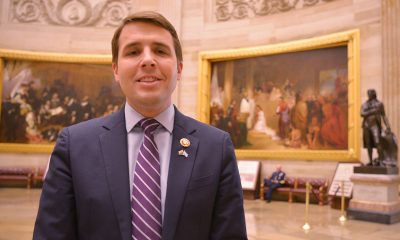Pennsylvania
Two LGBTQ candidates competing for state house seat in Philadelphia’s ‘gayborhood’
Victory Fund criticized for failing to stay neutral in race

Transgender community activist Deja Alvarez and LGBTQ rights and economic development advocate Jonathan Lovitz, both of whom have been involved in LGBTQ rights issues for many years, are running against each other and against two LGBTQ supportive straight men for a seat in the Pennsylvania House of Representatives in Philadelphia’s center city area.
Alvarez, Lovitz, public affairs consultant Ben Waxman, and café owner and community activist Will Gross are running in the May 17 Democratic primary in the 182nd District, which includes Philadelphia’s “Gayborhood” and is believed to have more LGBTQ residents than any other legislative district in the state.
The seat has been held since 2013 by out gay Rep. Brian Sims, who is giving up the seat this year to run for Pennsylvania lieutenant governor. Sims, a close friend and current housemate of Alvarez, has endorsed her to succeed him as representative of the 182nd District.
Lovitz supporters have expressed concern that Sims may have orchestrated a lobbying campaign that persuaded and possibly pressured the LGBTQ Victory Fund, the national group that raises money to help elect out LGBTQ candidates for public office, to endorse Alvarez. Lovitz backers have argued that the Victory Fund should have endorsed him, remained neutral, or made a dual endorsement of Alvarez and Lovitz as it has in other races where LGBTQ candidates have run against each other.
Lovitz backers also point out that Lovitz has raised far more campaign funds than Alvarez and the other two candidates, making him a more viable candidate than Alvarez and the one with the best chance of being elected as another LGBTQ person to the 182nd District seat.
Elliot Imse, the Victory Fund’s vice president for communications who was just named executive director of the sister organization Victory Institute, told the Washington Blade about 11 LGBTQ elected officials from across the country sent the Victory Fund a letter encouraging the group to endorse Alvarez. He said it was a “polite and respectful” letter.”
He said the Victory Fund welcomes input from the community and from supporters of all LGBTQ candidates on which candidates to endorse. According to Imse, it was the group’s 150-member Campaign Board, which consists of politically engaged activists from throughout the country, that voted to endorse Alvarez after analyzing a wide range of factors in the race. But some critics familiar with the Victory Fund, who spoke on the condition of anonymity, said the lobbying by Sims’s supporters of board members was irregular and drew the ire of Victory Fund leadership.
Although it decided to endorse Alvarez, the Victory Fund considers Lovitz to be a highly qualified candidate who would be an excellent state legislator representing the interests of LGBTQ people in Pennsylvania, Imse said. But he said the group determined that Alvarez’s background and status as a Latina trans candidate make her the right candidate for the job at this time.
“Deja is a candidate with extremely strong name recognition in her district,” Imse said. “She’s worked in the district for decades,” he said, “from founding organizations to help LGBTQ people who are homeless to help trans people through recovery programs, to providing COVID relief to immigrants and undocumented people,” he said.
“Deja is a Latinx trans woman and would be the first in the entire nation elected to a state legislature,” he said, as well as the first trans person elected to the Pennsylvania Legislature.
Alvarez currently serves as director of community engagement for World Healthcare Infrastructures, a Philadelphia-based group that provides HIV/AIDS related services and other community healthcare and social services. She also serves as the LGBTQ Care Coordinator for the Philadelphia Department of Public Health and, among other posts, was appointed to a task force to create an LGBTQ Advisory Board for the Philadelphia District Attorney’s Office.
Lovitz supporters point to what they call his long, highly distinguished record as an advocate for LGBTQ rights and public policy and economic development related issues that have resulted in endorsements from both organized labor and groups representing small community-based businesses.
Lovitz has served as senior vice president of the National LGBT Chamber of Commerce from 2016 until he announced his candidacy for the state house seat last year. He joined the LGBT Chamber in 2015 as vice president for external affairs and as director of the group’s New York subsidiary.
He has been credited with helping to write and pass more than 25 state and local laws, including in Pennsylvania, extending economic opportunity to LGBTQ-owned businesses around the country, including millions of dollars in small business grants to local and minority-owned businesses. In 2020, Lovitz co-founded PhillyVoting.org, an initiative to register and turn out the vote in the Black and LGBTQ communities, which, among other things, resulted in the registration of more than 300 new voters in the program’s first month.
The most recent campaign finance reports filed with the state’s campaign finance office show that as of January of this year the Lovitz campaign had raised $152,355. The reports show that Waxman had raised $45,276, Alvarez raised $35,941, and Gross raised $22,134 as of the January filing period. The next round of finance reports was scheduled to be released on May 6.
Some critics of Alvarez have pointed out that she had not been living in the 182nd District for a number of years and only recently moved back to run for the state house seat. Imse called such claims unfair and misleading, saying Alvarez at some point in the recent past was forced to find an apartment in another area outside the district because of the excessively high cost of living in the Center City area due to gentrification.
Imse said Alvarez continued to work in the district and retained her “decades long” ties to the district before she moved back to the district and became housemates with Sims to enable her and Sims to share the living costs in a high-priced neighborhood.
Alvarez told the Blade she and her supporters believe rumors circulating that she was unqualified for the state house seat because she had not been living in the district and just moved back were being orchestrated by Lovitz and his campaign to discredit her.
She said she has been living in Philadelphia since the late 1990s and has been living and working in the district most of the time for more than 20 years.
“The fact of the matter is my opponent has been in Philadelphia for like three years,” she said. “As a woman of color, as a trans person and, yes, like many Philadelphians, there was a time I had to move out of this district because I could not afford to live here any longer,” Alvarez said.
“But there’s not a single person out there and in this race that has both worked in this district, socialized in this district and then come back and done all the work that I’ve done in this district, which I have been part of for more than half of my life,” she said.
When asked to respond to Alvarez’s remarks, Lovitz said in an email that he has had a “lifelong connection to Philadelphia that no one can dispute” and that he moved to the 182nd District in 2017.
“What matters to me, and to voters, isn’t how long you live somewhere, but how much you’ve done to make their lives better in the time you’ve been there,” he said. “Since the day I returned home to Philly I’ve helped register over 1,000 voters through the PhillyVoting project; protected women’s rights by volunteering as a Planned Parenthood escort in my neighborhood; raised millions for charity through the boards I serve on and the events I’ve had the honor of emceeing; and so much more because I love my city.”
Additional information about each of the four candidates running in the Democratic primary can be accessed on their campaign websites, which show that each received endorsements from various advocacy or political organizations, with Alvarez, Lovitz, and Waxman receiving endorsements by local and state elected officials: lovitzforpa.com, dejaforpa.com, votewaxman.com, WillforPA.com.
Pennsylvania
White House freezes $175 million in funding for UPenn over trans athletes
Decision centers on decision to ‘allow’ Lia Thomas to compete on women’s swim team

The University of Pennsylvania learned Wednesday from Fox News and social media that the Trump-Vance administration is pausing $175 million in federal funding because of its nondiscrimination policy that allows transgender student athletes to compete as their authentic selves.
A reporter from Fox Business was first to break the news, describing the decision as a “pro-active punishment” for UPenn’s policy which she said violated Trump’s executive order, signed last month, banning “men from competing in women’s sports.”
BREAKING: The Trump Administration has “paused $175 million in federal funding from the University of Pennsylvania” over its policies forcing women to compete with men in sports.
Promises made, promises kept. pic.twitter.com/o4yiiqtH9d
— Rapid Response 47 (@RapidResponse47) March 19, 2025
The reporter went on to say an ongoing Title IX investigation puts the university “at risk of losing all its federal funding” because Lia Thomas, a former UPenn student athlete, made history three years ago this week by competing with other women.
That investigation, according to Fox, centers on the school’s decision to “allow transgender and biological male Lia Thomas to compete on the women’s swim team, use women’s locker rooms while exposing his male genitalia to his fellow female athletes.”
A spokesperson for the university told Fox it had not received any “official notification” of the decision on funding by the Trump administration. UPenn said the university was and is in “full compliance” with NCAA and Ivy League policies:
“We are aware of media reports suggesting a suspension of $175 million in federal funding to Penn, but have not yet received any official notification or any details. It is important to note, however, that Penn has always followed NCAA and Ivy League policies regarding student participation on athletic teams. We have been in the past, and remain today, in full compliance with the regulations that apply to not only Penn, but all of our NCAA and Ivy League peer institutions.”
As the Washington Blade reported on March 17, 2022, Thomas was a UPenn senior when she became the NCAA’s first openly trans Division 1 national champion at the Women’s Swimming and Diving Championship held in Atlanta that day. She won the 500-yard freestyle with a time of 4:33:24, one second faster than her closest competitor.
Thomas graduated in 2022 and started her pursuit of a law degree and the chance to compete in last summer’s Olympic Games in Paris. The Court of Arbitration for Sport upheld a worldwide ban on trans women athletes in June 2024, ending her dream of swimming at the Olympics or any other women’s competition, as the Blade reported.
Thomas did not respond to a request for comment Wednesday evening. Last summer, the aspiring attorney commented on the decision that smashed her hopes of competing again.
“Blanket bans preventing trans women from competing are discriminatory and deprive us of valuable athletic opportunities that are central to our identities,” said Thomas.
Openly trans athlete and activist Chris Mosier noted in a video posted on Instagram that Thomas and the university were in total compliance with rules of that time, and that the funding is being frozen despite the fact Trump was not even in office when Thomas competed.
View this post on Instagram
Also speaking out Wednesday was Riley Gaines, who tied with Thomas for fifth place at the 2022 championships and has gone to become a paid spokesperson for anti-inclusion women’s sports organizations.
“The Trump administration has yet again taken swift action to uphold common sense and preserve women’s opportunities by pausing $175 million in federal funding to the University of Pennsylvania,” Gaines told Fox News.
UPenn’s policy appears online, stating: “The Policy of Equal Opportunity, Affirmative Action and Nondiscrimination at the University of Pennsylvania states “the University of Pennsylvania prohibits unlawful discrimination based on race, color, sex, sexual orientation, gender identity, religion, creed, national or ethnic origin, citizenship status, age, disability, veteran status, or any other legally protected class.”
“The federal Title IX Policy extends to trans students; it states “No person in the United States shall, on the basis of sex, be excluded from participation in, be denied the benefits of, or be subjected to discrimination under any education program or activity receiving federal financial assistance.”
Pennsylvania
Transgender Honduran woman canvasses for Harris in Pa.
Monserrath Aleman is CASA in Action volunteer

A transgender woman from Honduras has traveled to Pennsylvania several times in recent weeks to campaign for Vice President Kamala Harris and other Democratic candidates.
Monserrath Aleman traveled to York on Aug. 31 and Lancaster on Sept. 21 with a group of other volunteers from CASA in Action.
They door-knocked in areas where large numbers of African Americans, Black, and Latino voters live. Aleman and the other CASA in Action volunteers urged them to support Harris, U.S. Sen. Bob Casey (D-Pa.), and other down ballot Democratic candidates.
Aleman will be in Harrisburg on Nov. 2, and in York on Election Day.
“We achieved the goal that we had in mind and that we wanted to achieve,” she told the Washington Blade on Oct. 22 during a Zoom interview from Baltimore. “We knocked on doors, passed out flyers.”
Aleman cited Project 2025 — which the Congressional Equality Caucus on Thursday sharply criticized — when she spoke with the Blade.
“We know that there is a Project 2025 plan that would affect us: The entire immigrant Latino community, the LGBTI community, everyone,” said Aleman. “So that’s why I’m more motivated to go knocking on doors, to ask for help, for support from everyone who can vote, who can exercise their vote.”
She told the Blade that she and her fellow volunteers “did not have any bad response.”
Aleman grew up in Yoro, a city that is roughly 130 miles north of the Honduran capital of Tegucigalpa.
She left Honduras on Nov. 25, 2021.
Aleman entered Mexico in Palenque, a city in the country’s Chiapas state that is close to the border with Guatemala. The Mexican government granted her a humanitarian visa that allowed her to legally travel through the country.
Aleman told the Blade she walked and took buses to Ciudad Juárez, a Mexican border city that is across the Rio Grande from El Paso, Texas.
She scheduled her appointment with U.S. Customs and Border Protection while living at a shelter in Ciudad Juárez. Aleman now lives in Baltimore.
“Discrimination against the LGBTI community exists everywhere, but in Honduras it is more critical,” said Aleman.
Aleman added she feels “more free to express herself, to speak with someone” in the U.S. She also said she remains optimistic that Harris will defeat former President Donald Trump on Election Day.
“There is no other option,” said Aleman.
Pennsylvania
Pa. House passes bill to repeal state’s same-sex marriage ban
Measure now goes to Republican-controlled state Senate

The Democratic-controlled Pennsylvania House of Representatives on July 2 passed a bill that would repeal the state’s same-sex marriage ban.
The marriage bill passed by a 133-68 vote margin, with all but one Democrat voting for it. Thirty-two Republicans backed the measure.
The bill’s next hurdle is to pass in the Republican-controlled Pennsylvania Senate.
State Rep. Malcolm Kenyatta (D-Philadelphia), a gay man who is running for state auditor, noted to the Pittsburgh Tribune-Review the bill would eliminate a clause in Pennsylvania’s marriage law that defines marriage as “between one man and one woman.” The measure would also change the legal definition of marriage in the state to “a civil contract between two individuals.”
Kenyatta did not return the Washington Blade’s requests for comment.
The U.S. Supreme Court in 2015 in Obergefell v. Hodges extended marriage rights to same-sex couples across the country.
Justice Clarence Thomas in the 2022 decision that struck down Roe v. Wade said the Supreme Court should reconsider the Obergefell decision and the Lawrence v. Texas ruling that said laws that criminalize consensual same-sex sexual relations are unconstitutional. President Joe Biden at the end of that year signed the Respect for Marriage Act, which requires the federal government and all U.S. states and territories to recognize same-sex and interracial marriages.
Republican Virginia Gov. Glenn Youngkin earlier this year signed a bill that codified marriage rights for same-sex couples in state law. Pennsylvania lawmakers say the marriage codification bill is necessary in case the Supreme Court overturns marriage rights for same-sex couples in their state and across the country.
-

 District of Columbia5 days ago
District of Columbia5 days agoD.C. police seek help in identifying suspect in anti-gay threats case
-

 Virginia2 days ago
Virginia2 days agoYoungkin calls on gay Va. GOP LG candidate to exit race over alleged ‘porn’ scandal
-

 Opinions5 days ago
Opinions5 days agoOn Pope Francis, Opus Dei and ongoing religious intolerance
-

 Commentary4 days ago
Commentary4 days agoA conversation about queers and class












